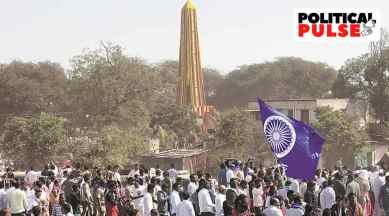Chandan Haygunde is an assistant editor with The Indian Express with 15 + years of experience in covering issues related to Crime, Courts, National Security and Human Rights. He has been associated with The Indian Express since 2007. Chandan has done investigative reporting on incidents of terrorism, left wing extremism, espionage cases, wildlife crimes, narcotics racket, cyber crimes and sensational murder cases in Pune and other parts of Maharashtra. While working on the ‘Centre for Science and Environment (CSE) Fellowship on Tigers, Tiger Habitats and Conservation’ in 2012, he reported extensively on the illegal activities in the Sahyadri Tiger Reserve in Maharashtra. He has done in-depth reporting on the cases related to the Koregaon Bhima violence in Pune and hearings of the ‘Koregaon Bhima Commission of Inquiry’. ... Read More
Five years and 10 extensions later, Bhima Koregaon inquiry goes on
The two-member inquiry commission has examined 48 witnesses so far, seven of them partly. More yet to be deposed.

Almost five years after it was constituted and after receiving 10 extensions, the Koregaon Bhima Commission of Inquiry has yet to complete its work.
As per a Maharashtra government order dated January 17, the Commission has been granted a fresh extension of three months till March 31. The earlier extension granted to the two-member Commission was valid till December 31, 2022.
monthly limit of free stories.
with an Express account.
The Commission is headed by retired Kolkata High Court judge J N Patel and its second member is former Maharashtra Chief Secretary Sumit Malik.
Formed on February 9, 2018, the Commission was tasked with inquiring into the “exact sequence” of events that led to violence on January 1 that year on the occasion of the 200th anniversary Battle of Koregaon Bhima. A person died and several others were injured in the violence.
After it was set up, the Commission appealed to people and government officials to submit information in connection to the violence in the format of an affidavit. “The Commission approximately received over 400 affidavits from the police, government officials and civilians,” said advocate Aashish Satpute who is representing the Commission.
The Commission then sorted out the witnesses it wanted to examine.
It went on to conduct hearings of witnesses in Mumbai and Pune for a few days every month. Lawyers representing different parties were allowed to cross-examine every witness during the hearings.
There are different parties before the Commission, but they can be divided into two sections. One claims that Hindutva leaders Milind Ekbote and Sambhaji Bhide instigated the violence. The other group blames the organisers of Elgaar Parishad, a conclave held in Pune a day before the violence, for allegedly acting on the behest of the banned CPI (Maoist).
Lawyers of the various parties, the lawyer for the gram panchayat of Vadhu Budruk that was among the villages affected by the violence, and Maharashtra public prosecutor Shishir Hiray have been cross-examining the witnesses.
The extensions so far
The Commission was initially given four months to submit its report, but its tenure has been repeatedly extended.
It has received three extensions of four months each and three extensions of six months each. It also got an extension of two months and two more extensions of three months each. In July 2021, during the Covid-19 pandemic, its term was extended by about five months.
From March 23, 2020, to August 2, 2021, the Commission stopped work because of the rise in Covid-19 cases. It conducted “semi-virtual hearings” after resuming work. Thereafter, due to the unavailability of a “bigger place” because of the pandemic, the Commission postponed its hearings. The Maharashtra government provided a larger place at the Sahyadri guest house in Mumbai – and the Commission resumed its hearings in September 2021.
However, the Commission was not able to complete the hearings of all the relevant witnesses. “We have so far examined 48 witnesses. Of these people, seven have been partly heard,” said Commission secretary VV Palnitkar.
Those who have deposed before the Commission so far include Nationalist Congress Party (NCP) chief Sharad Pawar, Ambedkarite leader Jogendra Kawade, officials from Pune City and Pune Rural Police, IAS officer Saurabh Rao, those who witnessed the violence, residents of the villages of Koregaon Bhima and Vadhu Budruk, and researcher Chandrakant Patil who submitted contemporary documents of the battle that took place in 1818.
The path ahead
The Commission’s latest hearings started on January 21 in Mumbai and will continue till January 25. Senior police officers such as IPS officers Vishwas Nangare Patil and Suvez Haque; Pune ACP Shivaji Pawar; and activist Harshali Potdar who organised Elgar Parishad have been summoned. They will be cross-examined.
Patil was the Special Inspector General of Police (SPL, IGP) of the Kolhapur Range at the time of the violence in Pune rural, which came under his jurisdiction. Haque was the superintendent (SP) of Pune Rural Police while Pawar investigated the case.
The Commission will continue hearings in Pune and Mumbai till March 31. It may seek a further extension if the hearings of important witnesses are not completed. The Commission is also likely to summon some senior politicians to depose before it in the coming months.